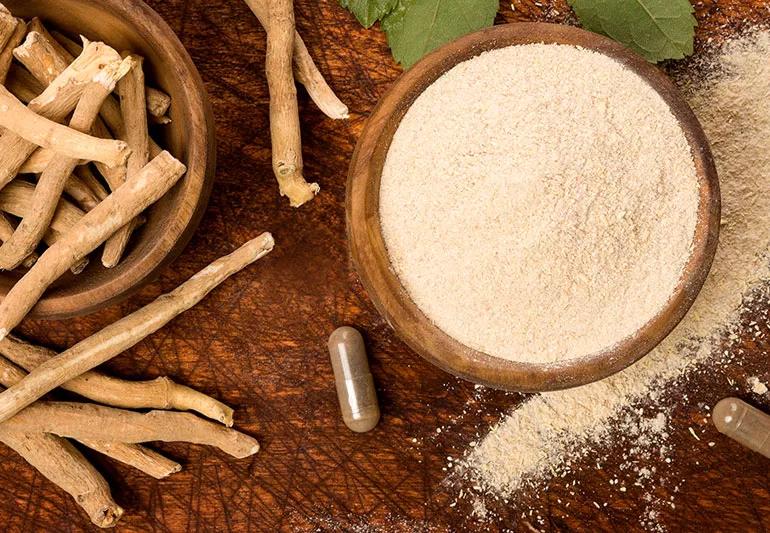The herbal medicine can increase energy, improve overall health and reduce inflammation, pain and anxiety

Image content: This image is available to view online.
View image online (https://assets.clevelandclinic.org/transform/8a557536-57ae-4279-bff1-463cd76a7573/AshwagandhaRootPowder-1041090420_770x533_jpg)
A bowl of cream-colored Ashwagandha powder, a brown root and olive-colored capsules
If you’re the nervous or stressed-out type, someone has probably given you a mini sermon about the wonders of ashwagandha.
Advertisement
Cleveland Clinic is a non-profit academic medical center. Advertising on our site helps support our mission. We do not endorse non-Cleveland Clinic products or services. Policy
They’ve probably told you that it can do just about everything including make you dinner and put the kids to bed. But if you’re skeptical about herbal medicine, you probably haven’t considered looking into ashwagandha. That’s OK. We’re going to do the legwork for you.
With the help of integrative medicine specialist Yufang Lin, MD, we’ll cover the basics and some of the medically proven benefits of using ashwagandha.
Ashwagandha (Withania somnifera), also known as “Indian Winter cherry” or Indian Ginseng,” is an evergreen shrub that’s found in India, Africa and parts of the Middle East.
So what is ashwagandha good for?
“Ashwagandha has long been used in Ayurvedic medicine to increase energy, improve overall health and reduce inflammation, pain and anxiety,” says Dr. Lin.
She adds that Ayurvedic medicine is the traditional medicine system in India. It’s a healing tradition that uses nutrition, exercise, mindfulness practices and herbs to promote balance between the body, mind, spirit and the environment.
Ashwagandha seems to fit the bill for those who prefer herbal medicines for several reasons.
Modern life is full of stress triggers. And that stress contributes to physical and mental illness. During stressful moments, the cortisol levels in your body become elevated, and this causes your heart to pump harder and faster. You breathe rapidly and your body generates more glucose for a quick burst of energy. Your mind becomes hyper-focused on any threats, and your body goes into fight or flight mode. When the stressful event is over, cortisol levels normalize and the associated symptoms resolve.
Advertisement
“Unfortunately, when a threat is chronic — whether it’s stress from finances or work — the stressful response also becomes chronic,” says Dr. Lin. “Over time, long-term stress can contribute to persistent inflammation and increases the risk for developing chronic conditions like obesity, diabetes, hypertension, heart disease, stroke, cancer, osteoporosis and fibromyalgia.”
So what does ashwagandha do? Research shows that it can help in several ways:
“People who are stressed or anxious, or people with chronic conditions might turn to ashwagandha to help ease their conditions,” says Dr. Lin.
Ashwagandha comes in a variety of forms. It’s available in gummies, capsules, liquid drops and powders that you can mix into drinks.
So how much ashwagandha per day should you consume? Regardless of the form you use, Dr. Lin says dosing is usually 500 mg twice a day.
But is ashwagandha safe? Dr. Lin says it mostly depends on the quality of the supplements. Her advice is to look for supplements that have been independently tested and verified by an outside company such as ConsumerLab, United States Pharmacopeia (USP), or National Sanitation Foundation International (NSF International).
While the side effects of ashwagandha are minimal, some people may experience:
“Most people can take this supplement, although it is always best to discuss it with your healthcare provider first,” says Dr. Lin.
If you have any issues with your thyroid, Dr. Lin strongly recommends checking with your healthcare provider before taking ashwagandha.
“Ashwagandha can augment thyroid function by increasing the conversion of the less potent thyroid hormone, T4, to the more active form of the thyroid hormone, T3,” says Dr. Lin. “Thus for some people, it can support a healthier thyroid function. On the other hand, if an individual’s thyroid is already borderline hyperactive, ashwagandha could contribute to frank hyperthyroidism.”
Other conditions which require caution when it comes to using ashwagandha include if you’re pregnant or breastfeeding, or if you have an autoimmune disease. In these cases, Dr. Lin advises talking to your provider before taking anything. She stresses this with pregnant women as ashwagandha could cause complications.
Overall, ashwagandha can be a part of your wellness plan — but remember it’s not a cure-all.
“Taking ashwagandha will not make the stress go away, but it may help reduce the symptoms so one feels more at ease,” says Dr. Lin. “But if you take the time to develop coping tools to help manage stress in the future, that will go much further in the long run.”
Advertisement
Advertisement

Sign up for our Health Essentials emails for expert guidance on nutrition, fitness, sleep, skin care and more.
Learn more about our editorial process.
Advertisement
Besides questionable effectiveness, herbal supplements aren’t safe for everyone
Natural doesn’t mean they’re safe or effective
With anti-fatigue, anti-aging and anti-cancer claims, this fungi still needs more studies
These plants and herbs can help reduce stress
For centuries, people have been drinking mullein tea for respiratory conditions
Find out what these options can do to the body
Learn how Chinese herbalism works and how to find a qualified practitioner
Commonly asked questions about vitamins and coronavirus
Type 2 diabetes isn’t inevitable with these dietary changes
Applying a hot or cold compress can help with pain
Pump up your iron intake with foods like tuna, tofu and turkey